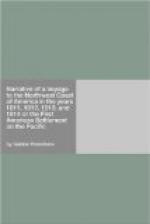Nothing further remarkable occurred to us till the 22d, when we passed the line in longitude 25 deg. 9”. According to an ancient custom the crew baptized those of their number who had never before crossed the equator; it was a holyday for them on board. About two o’clock in the afternoon we perceived a sail in the S.S.W. We were not a little alarmed, believing that it was the same brig which we had seen some days before; for it was lying to, as if awaiting our approach. We soon drew near, and to our great joy discovered that she was a Portuguese; we hailed her, and learned that she came from some part of South America, and was bound to Pernambuco, on the coasts of Brazil. Very soon after we began to see what navigators call the Clouds of Magellan: they are three little white spots that one perceives in the sky almost as soon as one passes the equator: they were situated in the S.S.W.
The 1st November, we began to see great numbers of aquatic birds. Toward three o’clock P.M., we discovered a sail on our larboard, but did not approach sufficiently near to speak her. The 3d, we saw two more sails, making to the S.E. We passed the tropic of Capricorn on the 4th, with a fine breeze, and in longitude 33 deg. 27”. We lost the trade-winds, and as we advanced south the weather became cold and rainy. The 11th, we had a calm, although the swell was heavy. We saw several turtles, and the captain having sent out the small boat, we captured two of them. During the night of the 11th and 12th, the wind changed to the N.E., and raised a terrible tempest, in which the gale, the rain, the lightning, and thunder, seemed to have sworn our destruction; the sea appeared all a-fire, while our little vessel was the sport of winds and waves. We kept the hatches closed, which did not prevent us from passing very uncomfortable nights while the storm lasted; for the great heats that we had experienced between the tropics, had so opened the seams of the deck that every time the waves passed over, the water rushed down in quantities upon our hammocks. The 14th, the wind shifted to the S.S.W., which compelled us to beat to windward. During the night we were struck by a tremendous sea; the helm was seized beyond control, and the man at the wheel was thrown from one side of the ship to the other, breaking two of his ribs, which confined him to his berth for a week.
In latitude 35 deg. 19”, longitude 40 deg., the sea appeared to be covered with marine plants, and the change that we observed in the color of the water, as well as the immense number of gulls and other aquatic birds that we saw, proved to us that we were not far from the mouth of the Rio de la Plata. The wind continued to blow furiously till the 21st, when it subsided a little, and the weather cleared up. On the 25th, being in the 46th degree, and 30 minutes of latitude, we saw a penguin.




